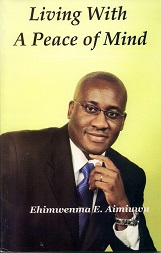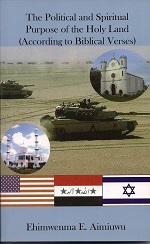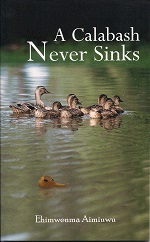 |
TEACH YOURSELF GUOSA LANGUAGEBOOK 2 Guosa Publication Services, (April, 2000)
Alex G. Igbineweka
Director of Edo & Guosa Languages American Heritage University 2035 North D Street San Bernardino, CA 92405
Cell Phone: (510) 706-5652
Phone: 909.713.0186 Toll Free: 888.484.8689 Fax: 909.886.8055 Email: president@amheritageuniv.net, guosa-language@amheritageuniv.net, guosa-language2@aol.com © All Rights reserved. No part of this book may be reproduced or transmitted in any form or by any means, electronic or mechanical, including photocopying and recording, or by any information storage or retrieved system without the prior written permission of Guosa Publication Services; or, Alex Igbineweka unless such copying is expressly permitted by federal copyright law. Address inquiries to: Guosa Publication Services, External Office, P.O. Box 2797, Richmond, CA 94802-2797. PRINTED AND PUBLISHED IN THE USA Ìfìnèrí: In 1914, the Northern and Southern Protectorates of a colony, an administrative boundaries set up by the British colonialists, were dismantled and the colonies merged by Sir Frederick Lord Lugard. The merger became the first political turning point and a milestone development. It brought about the birth through the amalgamation of a unit geo-entity and nation called Nigeria. Consequently, Nigeria did not evolve through any known ethnographic origins. The amalgamation was cosmetic and that can be seen as such because there were no elements of homogeneity in the peoples that occupied the vast landmass. |
The Political & Spiritual Purpose of the
Holy Land |
||
|
Advertise here for just $500 / month |
Advertise here for just $500 / month |
|||
 |
||||
And then, in 1960, a new Nation State earned her right to self-determination and government. Nigeria, now a sovereign entity followed in the wake of the traditions willed to her by her colonialists. She readily embraced the English Language as her tentative Lingua-franca. This was not done in isolation as the country took due cognizance of the fact that Nigeria is a land of contrasts. From present day projections, about 100 million people populate Nigeria, as evidenced by figures from the National Population Census of 1991. Out of this astonishing number, it is believed that one out of every four Africans or one out of every six black persons in the world is a Nigerian by birth or otherwise. In the same vein also, there are at least 98,000 communities with a heterogeneous populace who speaks about 400 different languages in this same country. These data raise questions which border on the basis for cohesion, comprehension and unity in such diversity. It is an anthropological fact that Language plays a unifying role in the beginning, development, beliefs, and customs of any group of people. Language is a means by which words or expressions find meaning and is put into use. Basically, it is used as a means of giving out information, thoughts, skills, ideas, reasoning and ensure receipt of same from varied sources without loosing track of the desired objective. Language is capable of wearing several meanings and its message, mode, receptacle or feedback loop can influence action, behaviour, norms, mores, values and other extra perceptive roles of human beings in the society. As a direct result of the diverse cultural and ethnic peculiarities of Nigeria, the development of a common indigenous language has been at a very sluggish pace. Our adopted lingua franca is an imported impostor in the true sense of usage. This reasoning explains why it has become difficult to formulate decisively, an educational and socio-political, economic as well as culturally integrated policy than can form the foundation for a purposeful agrarian, industrial and even technological revolution. It is in the light of the ethnocentric peculiarities of Nigeria, coupled with the wide marginal differences in terms of her people, her customs and value system; her resources, environment, divergent cultures and religions, that the Guosa Language was evolved as a medium of common indigenous socially interwoven language and as a unifying mould towards building a virile and formidable society. The Guosa There are about 400 different ethnic languages, dialects and fractionalized dialects in Nigeria. The Guosa Language alone had in its evolution at least 100 of these divers tongues, beginning with just a pair in the mid-sixties. The scope of this is to evolve as much as the total number of languages and dialects in the country into the Guosa, which is made up of carefully detailed units of the different ethnic languages and divers cultures, so that in future years, Nigeria will be able to take her stand in the committees of lingua franca nations of the world. You will find below a vibrant list of languages presently supporting the conception of the Guosa Language by her originator and language evolutionist – Alex Igbineweka. Also, you will observe an abbreviated time line consisting of a series of unfolding national achievements as follows: 1914 brings with it, the unification of Nigeria by the gathering of the various ethnic groups (which have their own cultures, dialects and languages). The coming of l960, heralds the realization of Nigerian National Independence. An event of such magnificent proportion, that the independence alone certainly and naturally led to the inspirational genesis of the Guosa Language; in 1965, by her originator, Alex Ekhaguosa Igbineweka – a revisit of the 1914 coming together as a united Nigerian nation. Should the adoption of the Guosa Language be accomplished and cemented into the multi-ethnic and cultural fabric known as the country of Nigeria, it will progressively and purposefully move the populace towards a national consciousness and a sense of homogeneity. EVOLUTION OF LANGUAGES AND DIALECTS INTO THE GUOSA LANGUAGE (AS OF DATE)
1 Abayongo~ 35 Edo-Groups Guosa Language Tones: As the first major step in the Guosa Language, here are the basic tonal marking which you must keep in memory so as to be able to pronounce each word excellently. ´ High tone ` Low tone V Low to high ^ High to low. Mid-tone unmarked. Alphabetization: Á B D É È F G Í H J K L M N Ó Ò P R S T Ú V W Y Z Graphic Alphabetization: Áá Bb Dd Éé Èè Ff Gg Íí Hh Jj Kk Ll Mm Nn Óó Òò Pp Rr Ss Tt Uu Vv Ww Yy Zz Ilowe Naijeriya (Nigerian Peculiar SyllableConsonants) c: (ch) as in àbíncí: [food] gb: as in gbóntì: [hear/listen] ng: as in mo ng shìengá: [I am going] i.e. present continuous kp: as in íkpèrè: [adjective] Evolution: In the Guosa Language, visible and concrete objects are of Hausa, and or other northern Nigerian languages vocabularies origin; example: Guosa ~English Invisible or abstract things are of Igbo, Yoruba or other southern Nigeria language origin. Their evolution from either Igbo and or Yoruba depends mainly on the alphabetical sequences. For instance, let us take the word “come” in English which meant: bìa (in Igbo language); and a corresponding wá (in Yoruba language) respectively. To decide which word should come in first or which word should evolve into the Guosa, you go on alphabetical sequence. In the above words from Igbo and yoruba languages, you will see that bìa comes before wá alphabetically. Therefore, a sentence like: please, give me water (English) is thus evolved and translated as: bíko, fún mi ní rúwá (in the Guosa Language) because water is rúwá; and fún mi ní refers to give me. Verb Patterns: Guosa ~English ò chètó ájì ‘wá tí shìengá gídá~ our class Monitor
has gone home Present Progressive: mó ng sòngí ‘sóngà ~I am singing a song
Past Progressive: árdún gómà fífèjá, mó húsí nà Saot Afrika~ten years
ago, I was living in Belgium mótà mí tí mèjé ~my motor has broken down mó mà ~I know Verb Tense: (To be continued) Please ask any question about the Guosa Language and I shall be too pleased to provide you an up to date answer. Alex Igbineweka *A 20th Century Evolution, Nigeria, Africa |
